All You Need to Know About Herbs for Cats
As obligate carnivores, cats metabolize and utilize animal products more effectively than plant products. This makes them much more sensitive than humans or dogs to herbs. That doesn’t mean they can’t benefit from the medicinal use of herbs, but we need to be cautious when it comes to herbs for cats.
Using herbs for cats

Chamomile smells good and can help calm your cat. Photography ©Volosina | Getty Images.
“With cats, I always use the idea that less is more,” says Maria Williams, DVM, owner of Compassionate Care Holistic Veterinary Services in San Antonio. “Cats have a unique system of metabolizing drugs and even herbs, so we always dilute herbs out for safe use. We always have to remember that anything we put on a cat can and will be ingested if they can get to it.”
In her 27 years as a veterinarian, Dr. Williams has seen plenty of well-meaning people apply herbal flea products that were ingested, and the cats developed severe skin irritations at the application site or ended up in the emergency room with vomiting and diarrhea. “Please make sure anything you put on a cat has a well-established history of safe use,” she says.
Treat herbs for cats with the same caution you use with all medications, because overdosing, adverse reactions and negative herb-drug interactions can occur. That said, in small doses, all of these herbs can be used in cats to help them with specific issues, says Dr. Williams, who has practiced holistic veterinary medicine for more than 20 years and holds certifications in acupuncture and chiropractic medicine.
“I use a huge array of herbs in my practice, both Western and Chinese herbal formulas tailored to specific needs of the individual animal that is presented,” she says. “There are many herbal formulas that are safe for cats. I always ask clients to look for formulas that specifically list cats on the label and tell you exactly what is in the bottle.”
Stress-relieving catnip
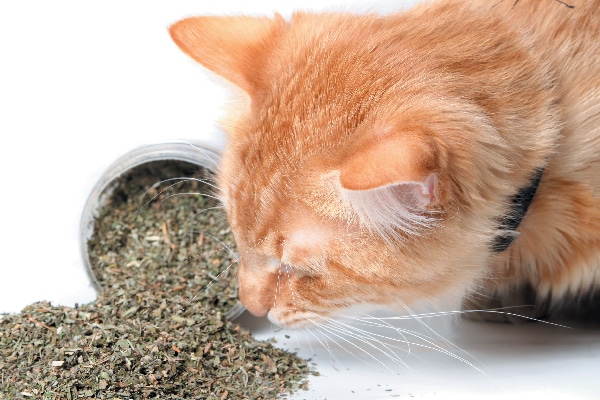
Catnip attracts some cats, enhancing playtime, plus calms and reduces stress. Photography ©gvictoria | Getty Images.
Catnip (Nepeta cataria) is a perennial herb from the mint family that contains nepetalactone, a pungent-smelling chemical that attracts about two thirds of adult cats.
This attractant makes it a popular additive to toys, scratchers, trees and other items people want their cats to be interested in. Cats lured by catnip will lick it, sniff it, kick it, roll on it and play like they’re under its influence anywhere from five to 15 minutes until it wears off.
Aside from enhancing their playtime and making us laugh, catnip also has a calming effect on cats. That’s why it’s one of Dr. Williams’ favorite herbs to recommend to her clients to use at home.
“We know stress-caused illness is a huge problem in cats, and anything that lowers anxiety will enhance their lives,” she says.
Stress is a real mental and physical health concern for cats and their people. Stress produces cortisol, a hormone that empowers the fight-or-flight response, which we all need in an emergency or life-threatening situation. But constant stress and the excessive release of cortisol can cause numerous health problems, including a compromised immune system.
The calming herbs help cats relax and allow them to enjoy their surroundings, as well as help keep their immune system strong naturally, Dr. Williams says. If your cat doesn’t react to catnip, other calming herbs may help.
Skin-soothing daisies
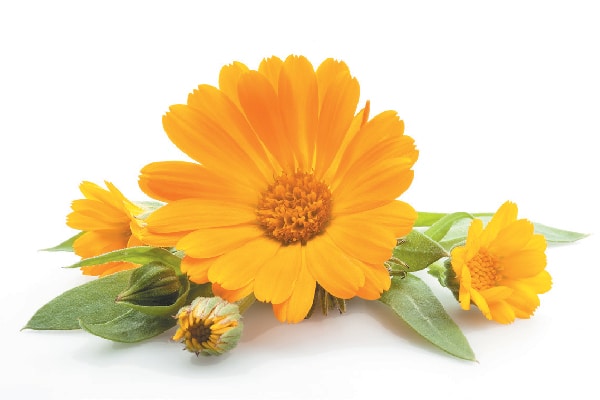
Only use the flowers of Calendula for a soothing tea, never the leaves or stems. Photography ©anna1311 | Getty Images.
Chamomile is an aromatic plant from the daisy family that is often used in herbal teas for humans. Many people drink this before bedtime as a sleep aid. Chamomile also calms cats.
In addition, the herb also can calm digestive upsets. “Chamomile made into a tea can be given to cats with stomach issues,” Dr. Williams says. “It helps soothe the stomach.”
Calendula is the genus of several marigold species, perennial plants also in the daisy family used to treat skin issues.
“Calendula flowers can be made into a tea, and this can be put onto cats with raw, irritated skin,” Dr. Williams says. However, she cautions: “Use only the flowers, as there have been reports of the leaves and stems containing toxic constituents.”
Echinacea is another genus in the daisy family used to boost immunity in people and pets. You’ll see this ingredient in cough lozenges and teas. Veterinary herbalists also use Echinacea and the other daisy-derived herbs to soothe skin conditions, including itching.
Herbs for cats with medicinal roots
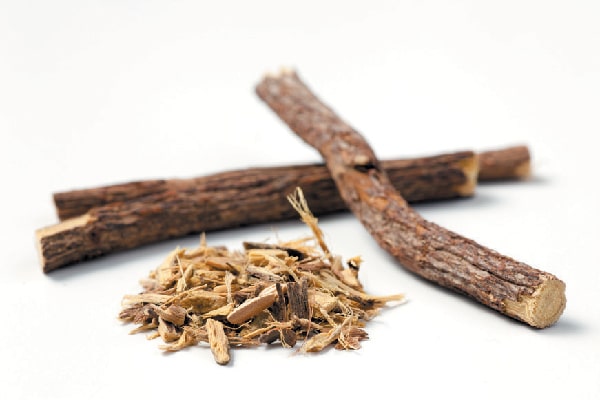
Licorice root has anti-inflammatory properties. Photography ©keithferrisphoto | Getty Images.
Licorice is the root of a perennial herb widely used in Traditional Chinese Medicine and as a flavoring in teas and candy because of its sweetness. “Licorice root acts as an herbal steroid, as it contains natural steroids,” Dr. Williams says. “A capsule of pure licorice root can be opened and made into a tea with 2 cups of water. You can give a few drops to cats with allergies and skin issues.” However, she cautions: “Please do not use licorice root if your cat has high blood pressure or has electrolyte disturbances.”
The natural anti-inflammatory properties of licorice root can also soothe arthritis pain, digestive upset and respiratory inflammation due to colds or allergies.
Goldenseal is a woodland plant from the buttercup family. The name probably stems from its bright yellow root, which is used in herbal medicine as a wound disinfectant. “This acts as an herbal antibiotic,” Dr. Williams says.
Valerian is a perennial herb, the root of which is used by humans as a sleep aid. This herb is also used to calm cats, but in some felines valerian has the opposite effect and acts as a stimulant. If that’s the case with your cat, you can use it as an alternative to catnip to entice sedentary or overweight cats to play.
5 cautions to take with herbs for cats
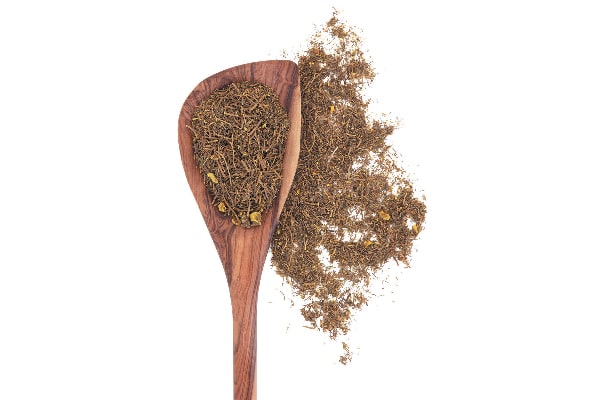
Goldenseal works as a wound disinfectant and antibiotic. Photography ©marilyna | Getty Images.
- Treat them with the same caution as you would with any medication. The liver filters out toxins from drugs and herbs, and this vital organ does not know the difference. Herbs can mix with drugs and cause overdosing or negative interactions. Cats’ livers do not process plant compounds the way human livers do, making cats more susceptible to toxic effects.
- Talk to your veterinarian before giving your cat any substance, including herbs and supplements. Your vet can ensure they will mix well with any medications your cat might be taking to avoid overdoses and negative reactions. Your vet also knows your cat’s condition and can advise you to avoid certain herbs that might make it worse. For example, licorice root can elevate blood pressure, so cats who already have hypertension should avoid it.
- Only use substances labeled for cats. Just because a product has been proven safe for a dog doesn’t mean it is safe for a cat.
- Follow the label instructions, including weight requirements, dosing and frequency. Pay attention to warnings about not exceeding certain amounts within a 24-hour period.
- Avoid products containing essential oils or alcohol. These are not safe for cats.
The bottom line on herbs for cats
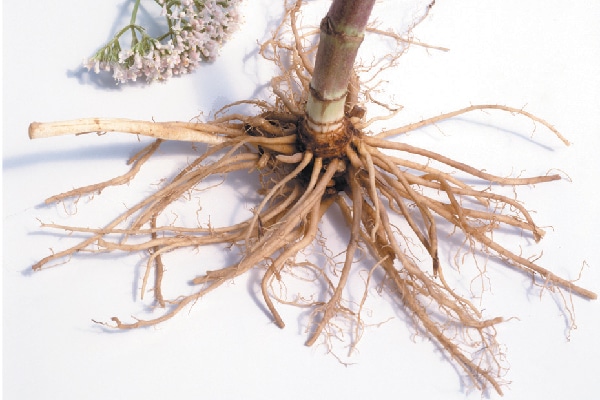
Valerian calms some cats and stimulates others. Photography ©emer1940 | Getty Images.
Make sure your veterinarian is aware of all herbs and supplements used in your cat’s care or see a holistic veterinarian for advice.
Tell us: What do you think about herbs for cats? Do you use any herbs for your cats?
Thumbnail: Photography ©Voren1 | Getty Images.
Susan Logan-McCracken is an award-winning writer who specializes in pet and human health topics. She and her husband share their Southern California home with two red tabbies.
Editor’s note: This article appeared in Catster magazine. Have you seen the new Catster print magazine in stores? Or in the waiting room of your vet’s office? Subscribe now to get Catster magazine delivered straight to you!
Read more about herbs for cats on Catster.com:
- 5 Totally Legal and Safe Ways to Get Your Cat Stoned
- Let’s Talk Non-Toxic Plants for Cats — What Plants Can Your Cat Eat?
- Safe Plants for Cats: What to Have in Your Garden
The post All You Need to Know About Herbs for Cats appeared first on Catster.
from Catster https://ift.tt/2sjj7KB
Comments
Post a Comment